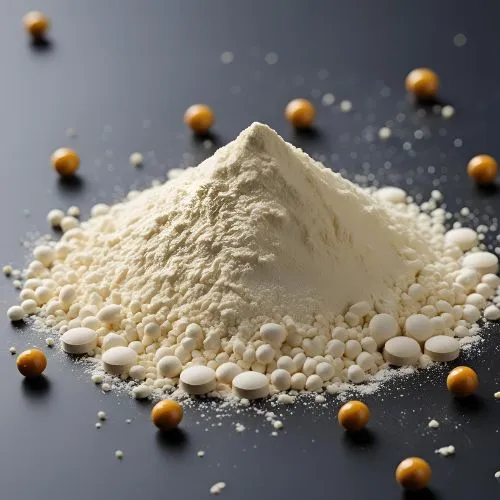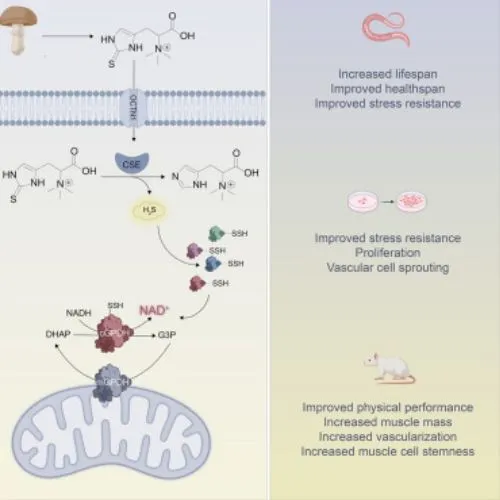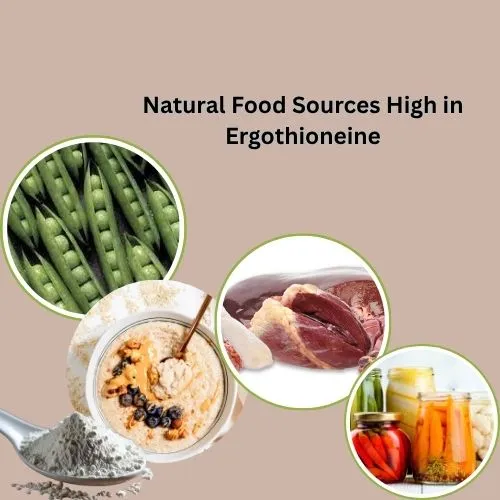What is the best source of ergothioneine?
Ergothioneine, a powerful antioxidant with numerous health benefits, has gained significant attention in recent years. As more people become aware of its potential, a common question arises: What is the best source of ergothioneine? This article will explore the top sources of this remarkable compound, its importance for cellular health, and how you can incorporate it into your diet.

Top Mushrooms Rich in Ergothioneine
When it comes to natural sources of ergothioneine, mushrooms reign supreme. These fungi are veritable powerhouses of this unique antioxidant. Let's examine some of the mushroom varieties that boast the highest ergothioneine content:
King Oyster Mushrooms: The Ergothioneine Champion
King oyster mushrooms (Pleurotus eryngii) stand out as one of the richest sources of ergothioneine. These large, meaty mushrooms not only offer a delectable culinary experience but also pack a significant ergothioneine punch. Their robust flavor and texture make them a versatile ingredient in various dishes, allowing you to boost your ergothioneine intake deliciously.
Maitake: A Flavorful Ergothioneine Source
Maitake mushrooms (Grifola frondosa), also known as "hen of the woods," are another excellent source of ergothioneine. These frilly, clustered mushrooms have a rich, earthy flavor and a tender texture. Besides their ergothioneine content, maitake mushrooms are prized for their potential immune-boosting properties, making them a valuable addition to a health-conscious diet.
Shiitake: A Versatile Ergothioneine Provider
Shiitake mushrooms (Lentinula edodes) are widely recognized for their umami flavor and medicinal properties. These popular mushrooms also contain significant amounts of ergothioneine. Their versatility in cooking and widespread availability make them an accessible option for those looking to increase their ergothioneine intake through dietary sources.
Oyster Mushrooms: An Ergothioneine-Rich Delicacy
Various species of oyster mushrooms (Pleurotus spp.) are notable for their ergothioneine content. These fan-shaped fungi are not only delicious but also offer a substantial product boost. Their delicate flavor and tender texture make them an excellent choice for those new to incorporating mushrooms into their diet.

Why Ergothioneine is Vital for Cell Health?
Understanding the importance of ergothioneine in cellular health can help appreciate why seeking out the best sources is crucial. Let's delve into the vital roles this compound plays in maintaining optimal cellular function:
Potent Antioxidant Protection
Ergothioneine acts as a powerful antioxidant, protecting cells from oxidative stress. Unlike many other antioxidants, it has a unique ability to accumulate in tissues prone to oxidative injury, such as the liver, kidneys, and eyes. This targeted protection makes product particularly valuable in maintaining cellular health and preventing age-related degeneration.
Mitochondrial Support
Mitochondria, often called the powerhouses of cells, benefit greatly from ergothioneine. This compound helps protect mitochondrial DNA from oxidative damage, ensuring these vital organelles can continue producing energy efficiently. By supporting mitochondrial function, it plays a crucial role in maintaining overall cellular health and energy production.
DNA Protection
Ergothioneine has demonstrated an ability to protect DNA from oxidative damage. This protection is crucial for maintaining cellular integrity and preventing mutations that could lead to various health issues. By safeguarding genetic material, it contributes to long-term cellular health and potentially aids in preventing age-related diseases.
Anti-Inflammatory Properties
Research suggests that ergothioneine possesses anti-inflammatory properties. Chronic inflammation is implicated in numerous health conditions, including cardiovascular disease and neurodegenerative disorders. By helping to modulate inflammatory responses, it may contribute to overall health and longevity.

Natural Food Sources High in Ergothioneine
While mushrooms are the most concentrated source of ergothioneine, several other foods contain this valuable compound. Incorporating a variety of these foods into your diet can help ensure a steady intake of ergothioneine:
Legumes: A Plant-Based Ergothioneine Option
Certain legumes, particularly black beans and red beans, contain notable amounts of ergothioneine. These versatile and nutritious foods not only provide ergothioneine but also offer a wealth of other health benefits, including fiber, protein, and various vitamins and minerals. Incorporating legumes into your diet can be an excellent way to boost your ergothioneine intake, especially for those following plant-based diets.
Oat Bran: A Surprising Ergothioneine Source
Oat bran, the outer layer of the oat grain, is another unexpected source of ergothioneine. This fiber-rich food not only contributes to digestive health but also provides a modest amount of ergothioneine. Adding oat bran to your breakfast routine or incorporating it into baked goods can be an easy way to increase your ergothioneine consumption.
Organ Meats: A Concentrated Animal Source
For those who consume animal products, organ meats, particularly liver, can be a significant source of ergothioneine. While not as concentrated as mushrooms, organ meats offer a notable amount of this compound along with other essential nutrients. However, it's important to consume organ meats in moderation due to their high cholesterol content.
Fermented Foods: Ergothioneine Through Microbial Action
Some fermented foods can be sources of ergothioneine, thanks to the action of certain bacteria during the fermentation process. Foods like tempeh, a fermented soybean product, may contain product. Incorporating a variety of fermented foods into your diet not only provides potential ergothioneine benefits but also supports gut health through probiotic action.

Conclusion
While mushrooms, particularly varieties like king oyster, maitake, shiitake, and oyster mushrooms, stand out as the best sources of ergothioneine, a diverse diet incorporating legumes, oat bran, and even certain animal products can help ensure a steady intake of this vital compound. By understanding the importance of ergothioneine for cellular health and recognizing its various dietary sources, you can make informed choices to support your overall well-being.
For those interested in exploring ergothioneine supplementation or seeking high-quality ergothioneine powder for product formulation, Yangge Biotech Co., Ltd. offers premium products derived from natural sources. Our ergothioneine powder is certified Halal, Kosher, FDA-approved, and complies with ISO9001 standards. For more information or inquiries, please contact us at info@yanggebiotech.com.
References
1. Halliwell, B., Cheah, I. K., & Tang, R. M. Y. (2018). Ergothioneine - a diet-derived antioxidant with therapeutic potential. FEBS Letters, 592(20), 3357-3366.
2. Ames, B. N. (2018). Prolonging healthy aging: Longevity vitamins and proteins. Proceedings of the National Academy of Sciences, 115(43), 10836-10844.
3. Cheah, I. K., & Halliwell, B. (2012). Ergothioneine; antioxidant potential, physiological function and role in disease. Biochimica et Biophysica Acta (BBA) - Molecular Basis of Disease, 1822(5), 784-793.
4. Gründemann, D. (2012). The ergothioneine transporter controls and indicates ergothioneine activity—A review. Preventive Medicine, 54, S71-S74.
5. Borodina, I., Kenny, L. C., McCarthy, C. M., Paramasivan, K., Pretorius, E., Roberts, T. J., ... & Kell, D. B. (2020). The biology of ergothioneine, an antioxidant nutraceutical. Nutrition Research Reviews, 33(2), 190-217.

Based on your location and order quantity, you will have the opportunity to receive a limited time free shipping promotion!

Who we are


